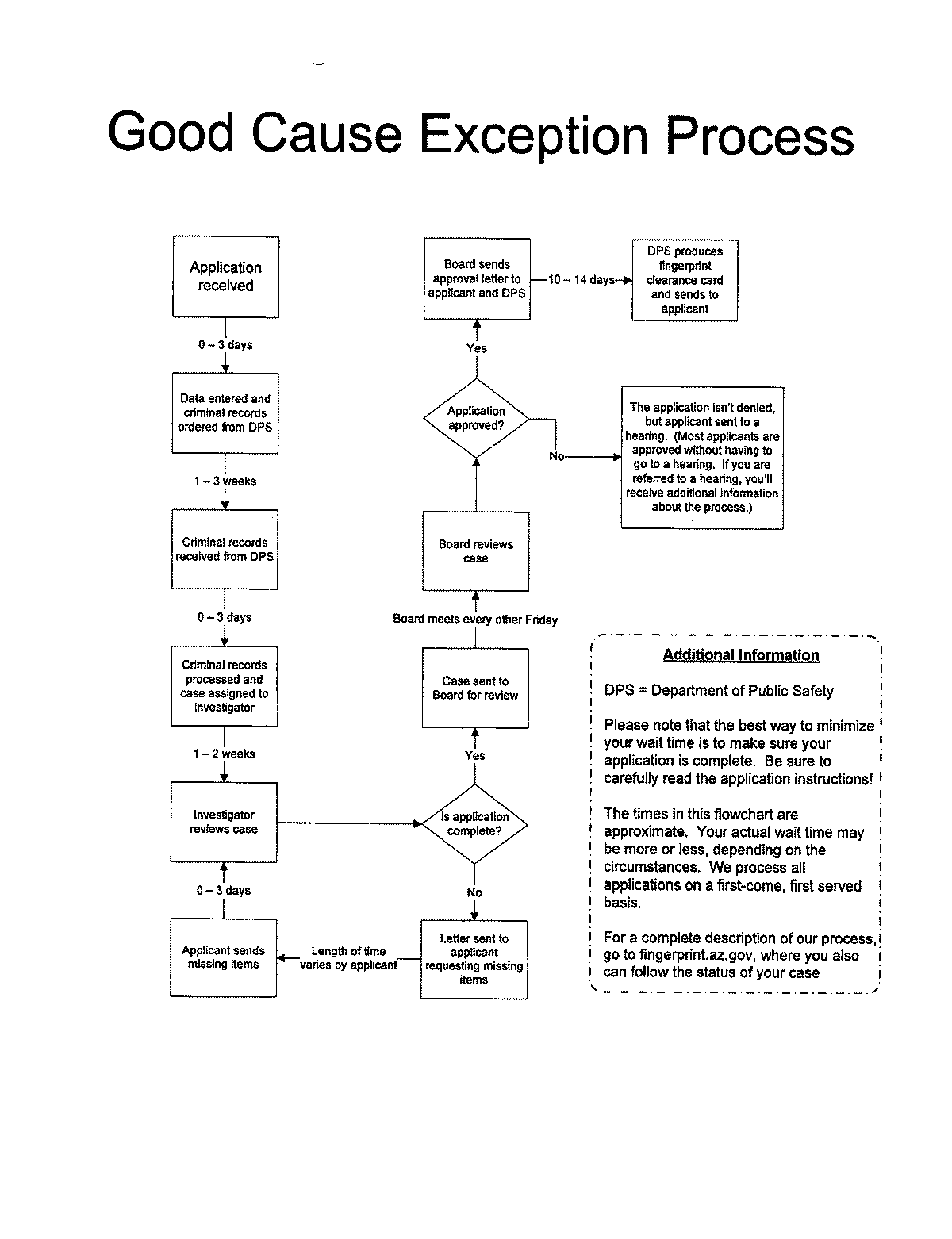41-619.55. Good cause exceptions; expedited review; hearing; revocation
- The board shall determine good cause exceptions. The board shall determine a good cause exception after an expedited review or after a good cause exception hearing. The board shall conduct an expedited review within twenty days after receiving an application for a good cause exception.
- Within forty-five days after conducting an expedited review, the board shall hold a good cause exception hearing if the board determines that the applicant does not qualify for a good cause exception under an expedited review but is qualified to apply for a good cause exception and the applicant submits an application for a good cause exception within the time limits prescribed by rule.
- When determining whether a person is eligible to receive a good cause exception under an expedited review, the board shall consider whether the person has shown to the board’s satisfaction that the person is not awaiting trial on or has not been convicted of committing any of the offenses listed in section 41-1758.03, subsection B or section 41-1758.07, subsection B or that the person is successfully rehabilitated and is not a recidivist. Before granting a good cause exception under an expedited review, the board shall consider all of the criteria listed in subsection E of this section.
- The following persons shall be present during good cause exception hearings:
- The board or its hearing officer.
- The person who requested the good cause exception hearing. The person may be accompanied by a representative at the hearing.
- The board may grant a good cause exception at a hearing if the person shows to the board’s satisfaction that the person is not awaiting trial on or has not been convicted of committing any of the offenses listed in section 41-1758.03, subsection B or section 41-1758.07, subsection B or that the person is successfully rehabilitated and is not a recidivist. Notwithstanding any other law, the board may require applicants to disclose evidence regarding substantiated allegations of child or vulnerable adult abuse or neglect for consideration in determining an applicant’s successful rehabilitation. If the applicant fails to appear at the hearing without good cause, the board may deny a good cause exception. The board shall grant or deny a good cause exception within eighty days after the good cause exception hearing. Before granting a good cause exception at a hearing the board shall consider all of the following in accordance with board rule:
- The extent of the person’s criminal record.
- The length of time that has elapsed since the offense was committed.
- The nature of the offense.
- Any applicable mitigating circumstances.
- The degree to which the person participated in the offense.
- The extent of the person’s rehabilitation, including:
- Completion of probation, parole or community supervision.
- Whether the person paid restitution or other compensation for the offense.
- Evidence of positive action to change criminal behavior, such as completion of a drug treatment program or counseling.
- Personal references attesting to the person’s rehabilitation.
- If the board grants a good cause exception to a person, the board shall request in writing that the department of public safety issue a fingerprint clearance card to the person.
- The board’s staff, under the direction of the executive director of the board, shall review reports it receives of the arrest, charging or conviction of a person for offenses listed in sections 41-1758.03 and 41-1758.07 who previously received a fingerprint clearance card. Except as provided by subsection J of this section, the executive director shall report any arrest, charge or conviction of a prohibited crime to the state agencies listed on the applicant’s fingerprint clearance card application.
- The board may request in writing that the department of public safety revoke a person’s fingerprint clearance card pursuant to section 41-1758.04 if the person received a fingerprint clearance card and the person is subsequently convicted of an offense listed in section 41-1758.03, subsection B or C or section 41-1758.07, subsection B or C.
- Pending the outcome of a good cause exception determination, the board or its hearing officer may issue interim approval in accordance with board rule to continue working to a good cause exception applicant.
- If the board’s staff, under the direction of the executive director, receives a report of an arrest, charging or conviction of a prohibited crime for a person who previously received a fingerprint clearance card pursuant to section 15-1881, the executive director shall not report this information to the state agency that is listed on the applicant’s fingerprint clearance card application but shall notify the person issued the fingerprint clearance card of the report.
- The board is exempt from chapter 6, article 10 of this title.
- A person who is required to obtain a fingerprint clearance card pursuant to section 41-619.52 is not eligible to receive a good cause exception pursuant to this section.
Here is a flowchart from DPS showing the process:

